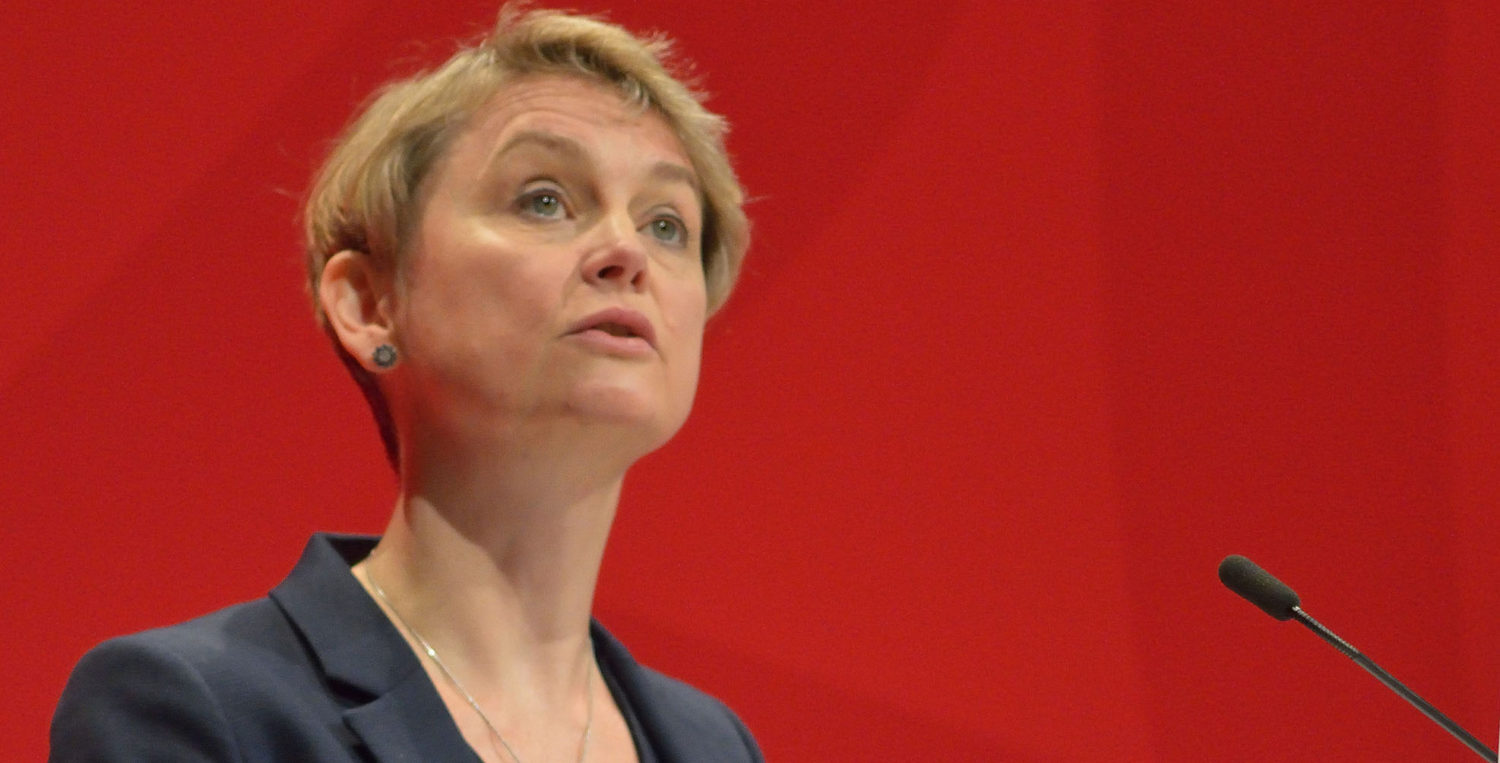Across party lines
If we want our country to heal we need a fresh approach, Yvette Cooper MP tells Kate Murray.
It’s rare to see an MP touted as an ideal prime minister not just by some in their own party but by a senior figure in a rival one. Yet Yvette Cooper, according to Lib Dem leadership contender Sir Ed Davey, is just the sort of person who could lead a government of national unity to get us out of the Brexit mess. Cooper shrugs off the suggestion – but she makes a pretty good pitch nonetheless for why that might just be the best option for Britain.
Cross-party working, building a consensus and healing divisions pepper her conversation. “I don’t see how that works,” she says of Davey’s suggestion that his party could help bring down the next Tory PM and then back someone like her to prevent the country crashing out of Europe without a deal. But she adds: “I think you do need cross-party working at the moment on issues that are as important as this. That’s why we had the cross-party working in the spring to prevent a chaotic no-deal Brexit which would have hit manufacturing jobs and when we’d been advised by the counter-terror chief in the country that it will make Britain less safe. I’ve got 15,000 manufacturing jobs in my constituency – you have a responsibility to work cross-party to sustain those sorts of jobs.”
Cooper namechecks politicians from both sides of the political divide as she argues for a citizens’ assembly as the ‘best next step’ on Brexit. “I started off very sceptical about citizens’ assemblies,” she says. “But listening to people like Stella Creasy, Lisa Nandy, Gordon Brown, Rory Stewart and others and looking at what’s been done in other parts of the world, I think it is an opportunity for people to come together with very different views, and to listen to evidence, to deliberate about evidence. This would be a different, more thoughtful way of trying to change and reform politics.”
But crucial to building consensus is an ability to reach out to other parties – and that quality has been lacking at the very top. As an MP first elected in the same year as Theresa May and then shadow home secretary when May was at the Home Office, Cooper is well-placed to give a verdict on the outgoing prime minister. And again national divisions are uppermost in her mind: even though she says she respects May’s hard work and ‘sense of duty’, ultimately the soon-to-be-ex PM failed because she ‘isn’t the kind of politician who reaches out’.
“It is tragic that she didn’t immediately after she became prime minister try to bring people together,” Cooper says. “I called on her at the time to set up a cross-party commission to do things to bring together people from both sides of the Brexit divide and to have a positive debate about what kind of future we wanted the country to have. And actually she did the opposite. She fuelled the divisions instead. I think that was a deep, deep mistake that has had huge consequences and has escalated and continued the polarisation in a really damaging way. I don’t know how long it’s going to take for the country to heal as a result.”
When she spoke at the recent Fabian Society summer conference, Cooper focused on the hostility and vitriol she sees poisoning our national political debate. It’s a subject she is keen to expand on, putting some of the blame on social media. “ Social media is a really good example of new technology that creates all kinds of amazing possibilities and has helped people reconnect with old friends from years ago and helped people build local campaigns to improve a local park,” she says. “But it’s also being used and exploited to incite hatred or extremism or abuse. I often talk to people who say they no longer do things online, or post their views on Facebook or on Twitter, for example, because they’re just fed up of the abuse that they receive. That’s not simply about people who are in public life – somebody was telling me she’d set up a local Facebook group just about trying to get some improvements in her local area. She ended up being targeted by abuse because of it and so she gave it up when actually she was just trying to do good and bring people together.”
Social media companies should do more, she says, to stamp down on the worst abuse. So too should those of us who use online platforms. “Sometimes it’s actually just about all of us being able to show some kindness and respect online, rather than getting sucked into ever greater short-term anger and abuse,” she explains. “We’ve got this new way of communicating. But we haven’t actually developed the sort of respectful and kind ways of doing so. It is possible to have very passionate debate and to be very angry about issues without being poisonous.”
Politicians must also do their bit to counter the current toxic climate. “There’s a huge responsibility on politicians not to polarise things, and not to increase the vitriol in politics, so leadership really matters.”
Out in the country, the divisions and inequality which contributed to the vote to leave the EU remain unresolved. Injustice in our economy was, says Cooper, behind her decision to chair the Changing Work Centre, set up by Community trade union and the Fabian Society. The issues it is exploring – how work is changing and how politicians and policy-makers should respond – are critical to building a society which works for all in the years to come.
“We are in danger as a country of missing the huge fundamental changes that are taking place in work, in the way we live our lives and around social justice,” she says.
“The labour movement came out of the industrial revolution and we also need to be at the forefront of the response to the digital and technological revolutions taking place at the moment.”
Just as the first industrial revolution generated huge wealth and growth but gross exploitation too, so today’s fast-changing world of work brings risks as well as opportunities, Cooper adds. In the work of the Changing Work Centre’s Commission on Workers and Technology she and her fellow commissioners have been travelling the country, talking to workers who have seen both the benefits and the disadvantages technology can bring. In one retail warehouse they visited, where the employer and trade union worked well together and workers were consulted, automation has made people’s jobs easier and boosted productivity. But in other settings, technology has been ‘used to control people and monitor the workforce and effectively penalise them if they’re not matching what are effectively particular robotic standards’.
She asks: “The question is: are we going to stand back and let technological change and the free market drive what happens? Or are we as human beings going to drive our future and use technology to empower people rather than using technology to exploit people?”
According to the commission’s interim findings, six out of 10 workers say they are shut out of decisions about new technology in their workplace – and that could widen inequality. “If the workforce is part of the discussions, it improves things in all sorts of different ways,” says Cooper. “First, you are more likely to get technological improvements that work because your workforce can tell you ‘actually that’s going to work’ and be really practical about it. Secondly, you’re more likely to get improvements that are fair. And thirdly it’s more likely to be sustainable.”
Technology, Cooper believes, is ‘the embodiment of the best of human creativity’. “We’ve always looked for creative new solutions to problems. That might be about using technology to tackle climate change, to help us do things with far less, to cut carbon emissions for example. Or it might be about using technology to help people work from home and juggle family life and work, or caring responsibilities and work,” she says. “It might be about new, creative jobs that are made possible by technology. It might be about all sorts of amazing things – there are always all kinds of new possibilities. The question is whether you use those new opportunities for good or whether they end up being used to exploit people instead.”
Cooper underlines the proud history of the Labour party in tackling injustice. So how does she feel now about the state of the party? She is adamant that antisemitism must be properly addressed. “It is just shameful that we still have Jewish colleagues and Jewish members in our party ending up being targeted by antisemitism. We have a long history of fighting racism. And I think it should shame all of us that the problem of antisemitism just hasn’t been addressed. My view is that we need now a proper, independent, transparent complaints process to deal with antisemitism.”
But she cautions against those who would leave Labour behind.
“The Labour party has always been at its strongest when it is a broad church,” she says. “From the very founding of the Labour party, we had the Fabians and the trade unions, the Marxists and the Methodists, the Christian socialists, the different traditions that all came together to form the Labour party. And part of what we believe in is the kinder gentler politics that Jeremy talked about in 2015.”
Cooper believes that broad church approach within Labour – and co-operation beyond the party – is vital to tackle our biggest challenges, starting with Brexit. She insists there is still time to establish a citizens’ assembly in September, before the crunch time for leaving the EU.
“It’s not an alternative to parliament because parliament has to be accountable and only parliament can take decisions. But it would be a supplement that allows a different way of looking at things because people should have their voices heard. And at the moment, the only way to do so is in these short bursts on social media,” she says. “I think it’s the best next step from where we are. I haven’t seen anybody trying to bring together leave and remain in a way that is constructive to try and find a way through.”
That is the Labour way, Cooper insists.
“Building consensus is not the same as defending the status quo. The times when we have done radical things – like building the NHS or building the welfare state – are when we have built a consensus.”
Photo credit: Rwendland


